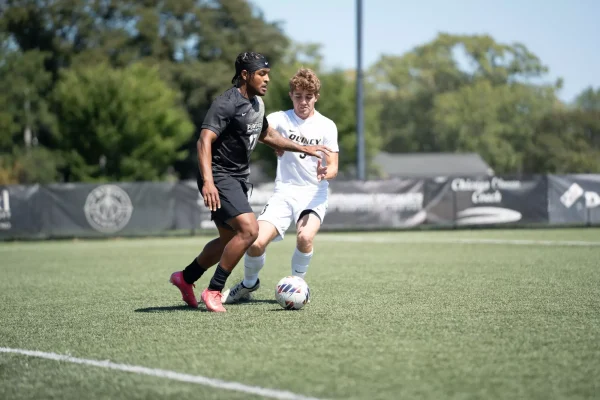Advancing to the NCAA
PNW won an appeal to overturn the NCAA’s July 15 decision to reject the university from admission during a hearing on Sept. 27.
Rick Costello, athletic director, said the support from both the faculty and student body as well as the combined athletic history of PNC and PUC showed that PNW is ready for the NCAA and led to the NCAA’s decision being overturned.
After getting accepted into the Greater Lakes Intercollegiate Athletics Conference on Jan. 14, PNW applied to and was rejected by the NCAA Membership Committee on July 15. PNW then appealed to a different, independent appeals sub-committee of the NCAA Membership Committee. It was comprised of various athletic directors, faculty athletic reps and senior women’s advisers from the NCAA.
PNW appealed once before on Aug. 19 to the NCAA membership committee that rejected their application initially, and was rejected again.
Jeff Ligney, interim head of the GLIAC, said that PNW had a strong resume and that the GLIAC rarely sees applicants that have the academic reputation, the facilities and student enrollment that PNW has.
“They have shown their commitment and dedication to running a top notch athletic department and that probably is the biggest reason we feel they are great candidates for the GLIAC and NCAA,” Ligney said.
Costello said that the GLIAC played a large role in PNW’s NCAA application process and that the GLIAC supported both the initial application to the NCAA and the appeal.
The GLIAC sent two letters to the NCAA in support of PNW’s admission. One letter was written in support of PNW’s initial NCAA application. The second, written following PNW’s rejection, was in support of the appeal filed by PNW.
Thomas Keon, chancellor, said that a university is often defined by its peers and that the GLIAC offers a group of peers that are similar to PNW in academics, athletics and philosophy.
“A lot of changes have been made in the university over the last ten or fifteen years, and all of those changes have been an opportunity as a university to upgrade the quality of our programs,” Keon said. “I see the entrance into the NCAA, and particularly the GLIAC, as a defining moment to show the community that we have changed,” Keon said.
In 2008, under the direction of the former Purdue Calumet athletic director, Bob Bunnell, PUC began the athletic expansion plan in hopes of increasing the amount of intercollegiate sports to meet the NCAA’s minimum requirement of twelve intercollegiate sports. Costello completed that goal in 2013 by increasing the amount of intercollegiate sports from 10 to 12.
“We are set up to succeed, but we’ve got to mature as an athletic program,” Costello said.
Though PNW reached the minimum amount of intercollegiate sports necessary for NCAA admission, many of the teams are still new. Men’s soccer was reintroduced in 2012 while baseball and softball were reintroduced in 2013. Women’s golf was added for the 2016-2017 season.
Caleb Brannon, junior health studies major, said that transferring to the GLIAC will be a challenging transition for PNW athletics due to the increased competition.
“It will be exciting to see what our institution is really made of,” Brannon said.
PNW will finish the 2016-2017 athletic season in the NAIA and CCAC and will begin competing in the GLIAC and NCAA during the 2017-2018 season. Due to NCAA rules, PNW will not be able to compete in the NCAA post-season competition until the 2019-2020 season.


